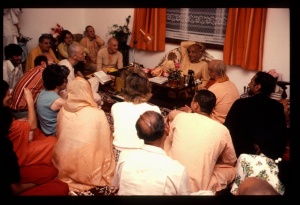CC Antya 7.134: Difference between revisions
m (1 revision(s)) |
(Vanibot #0054 edit - transform synonyms into clickable links, which search similar occurrences) |
||
| (One intermediate revision by one other user not shown) | |||
| Line 1: | Line 1: | ||
{{ | [[Category:Sri Caitanya-caritamrta - Antya-lila Chapter 07]] | ||
<div style="float:left">'''[[Sri Caitanya-caritamrta|Śrī Caitanya-caritāmṛta]] - [[CC Antya|Antya-līlā]] - [[CC Antya 7|Chapter 7: The Meeting of Śrī Caitanya Mahāprabhu and Vallabha Bhaṭṭa]]'''</div> | |||
<div style="float:right">[[File:Go-previous.png|link=CC Antya 7.133|Antya-līlā 7.133]] '''[[CC Antya 7.133|Antya-līlā 7.133]] - [[CC Antya 7.135|Antya-līlā 7.135]]''' [[File:Go-next.png|link=CC Antya 7.135|Antya-līlā 7.135]]</div> | |||
{{CompareVersions|CC|Antya 7.134|CC 1975|CC 1996}} | |||
{{RandomImage}} | |||
==== TEXT 134 ==== | ==== TEXT 134 ==== | ||
<div | <div class="verse"> | ||
śrīdhara-upare garve ye kichu likhibe | :śrīdhara-upare garve ye kichu likhibe | ||
:'artha-vyasta' likhana sei, loke nā mānibe | |||
</div> | </div> | ||
| Line 12: | Line 16: | ||
==== SYNONYMS ==== | ==== SYNONYMS ==== | ||
<div | <div class="synonyms"> | ||
śrīdhara- | ''[//vanipedia.org/wiki/Special:VaniSearch?s=śrīdhara&tab=syno_o&ds=1 śrīdhara]-[//vanipedia.org/wiki/Special:VaniSearch?s=upare&tab=syno_o&ds=1 upare]'' — above Śrīdhara Svāmī; ''[//vanipedia.org/wiki/Special:VaniSearch?s=garve&tab=syno_o&ds=1 garve]'' — in false pride; ''[//vanipedia.org/wiki/Special:VaniSearch?s=ye&tab=syno_o&ds=1 ye] [//vanipedia.org/wiki/Special:VaniSearch?s=kichu&tab=syno_o&ds=1 kichu] [//vanipedia.org/wiki/Special:VaniSearch?s=likhibe&tab=syno_o&ds=1 likhibe]'' — whatever you write; ''[//vanipedia.org/wiki/Special:VaniSearch?s=artha&tab=syno_o&ds=1 artha]-[//vanipedia.org/wiki/Special:VaniSearch?s=vyasta&tab=syno_o&ds=1 vyasta]'' — the opposite meaning; ''[//vanipedia.org/wiki/Special:VaniSearch?s=likhana&tab=syno_o&ds=1 likhana] [//vanipedia.org/wiki/Special:VaniSearch?s=sei&tab=syno_o&ds=1 sei]'' — such writing; ''[//vanipedia.org/wiki/Special:VaniSearch?s=loke&tab=syno_o&ds=1 loke] [//vanipedia.org/wiki/Special:VaniSearch?s=nā&tab=syno_o&ds=1 nā] [//vanipedia.org/wiki/Special:VaniSearch?s=mānibe&tab=syno_o&ds=1 mānibe]'' — no one will care about it. | ||
</div> | </div> | ||
| Line 19: | Line 23: | ||
==== TRANSLATION ==== | ==== TRANSLATION ==== | ||
<div | <div class="translation"> | ||
"Whatever you might write due to false pride, trying to surpass Śrīdhara Svāmī, would carry a contrary purport. Therefore no one would pay attention to it. | |||
</div> | </div> | ||
| Line 26: | Line 30: | ||
==== PURPORT ==== | ==== PURPORT ==== | ||
<div | <div class="purport"> | ||
Śrīmad-Bhāgavatam has many ṭīkās, or commentaries, following the paramparā system, but Śrīdhara | [[Srimad-Bhagavatam|''Śrīmad-Bhāgavatam'']] has many ''ṭīkās'', or commentaries, following the ''paramparā'' system, but Śrīdhara Svāmī's is first. The commentaries of all the other ''ācāryas'' follow his. The ''paramparā'' system does not allow one to deviate from the commentaries of the previous ''ācāryas''. By depending upon the previous ''ācāryas'', one can write beautiful commentaries. However, one cannot defy the previous ''ācāryas''. The false pride that makes one think that he can write better than the previous ''ācāryas'' will make one's comments faulty. At the present moment it has become fashionable for everyone to write in his own way, but such writing is never accepted by serious devotees. Because of false pride, every scholar and philosopher wants to exhibit his learning by interpreting the ''śāstras'', especially the [[Bhagavad-gita As It Is (1972)|''Bhagavad-gītā'']] and [[Srimad-Bhagavatam|''Śrīmad-Bhāgavatam'']], in his own way. This system of commenting in one's own way is fully condemned by Śrī Caitanya Mahāprabhu. Therefore He says, ' ''artha-vyasta'' ' ''likhana sei''. Commentaries written according to one's own philosophical way are never accepted; no one will appreciate such commentaries on the revealed scriptures. | ||
</div> | </div> | ||
__NOTOC__ | |||
<div style="float:right; clear:both;">[[File:Go-previous.png|link=CC Antya 7.133|Antya-līlā 7.133]] '''[[CC Antya 7.133|Antya-līlā 7.133]] - [[CC Antya 7.135|Antya-līlā 7.135]]''' [[File:Go-next.png|link=CC Antya 7.135|Antya-līlā 7.135]]</div> | |||
__NOTOC__ | |||
__NOEDITSECTION__ | |||
Latest revision as of 20:55, 19 February 2024

A.C. Bhaktivedanta Swami Prabhupada
TEXT 134
- śrīdhara-upare garve ye kichu likhibe
- 'artha-vyasta' likhana sei, loke nā mānibe
SYNONYMS
śrīdhara-upare — above Śrīdhara Svāmī; garve — in false pride; ye kichu likhibe — whatever you write; artha-vyasta — the opposite meaning; likhana sei — such writing; loke nā mānibe — no one will care about it.
TRANSLATION
"Whatever you might write due to false pride, trying to surpass Śrīdhara Svāmī, would carry a contrary purport. Therefore no one would pay attention to it.
PURPORT
Śrīmad-Bhāgavatam has many ṭīkās, or commentaries, following the paramparā system, but Śrīdhara Svāmī's is first. The commentaries of all the other ācāryas follow his. The paramparā system does not allow one to deviate from the commentaries of the previous ācāryas. By depending upon the previous ācāryas, one can write beautiful commentaries. However, one cannot defy the previous ācāryas. The false pride that makes one think that he can write better than the previous ācāryas will make one's comments faulty. At the present moment it has become fashionable for everyone to write in his own way, but such writing is never accepted by serious devotees. Because of false pride, every scholar and philosopher wants to exhibit his learning by interpreting the śāstras, especially the Bhagavad-gītā and Śrīmad-Bhāgavatam, in his own way. This system of commenting in one's own way is fully condemned by Śrī Caitanya Mahāprabhu. Therefore He says, ' artha-vyasta ' likhana sei. Commentaries written according to one's own philosophical way are never accepted; no one will appreciate such commentaries on the revealed scriptures.